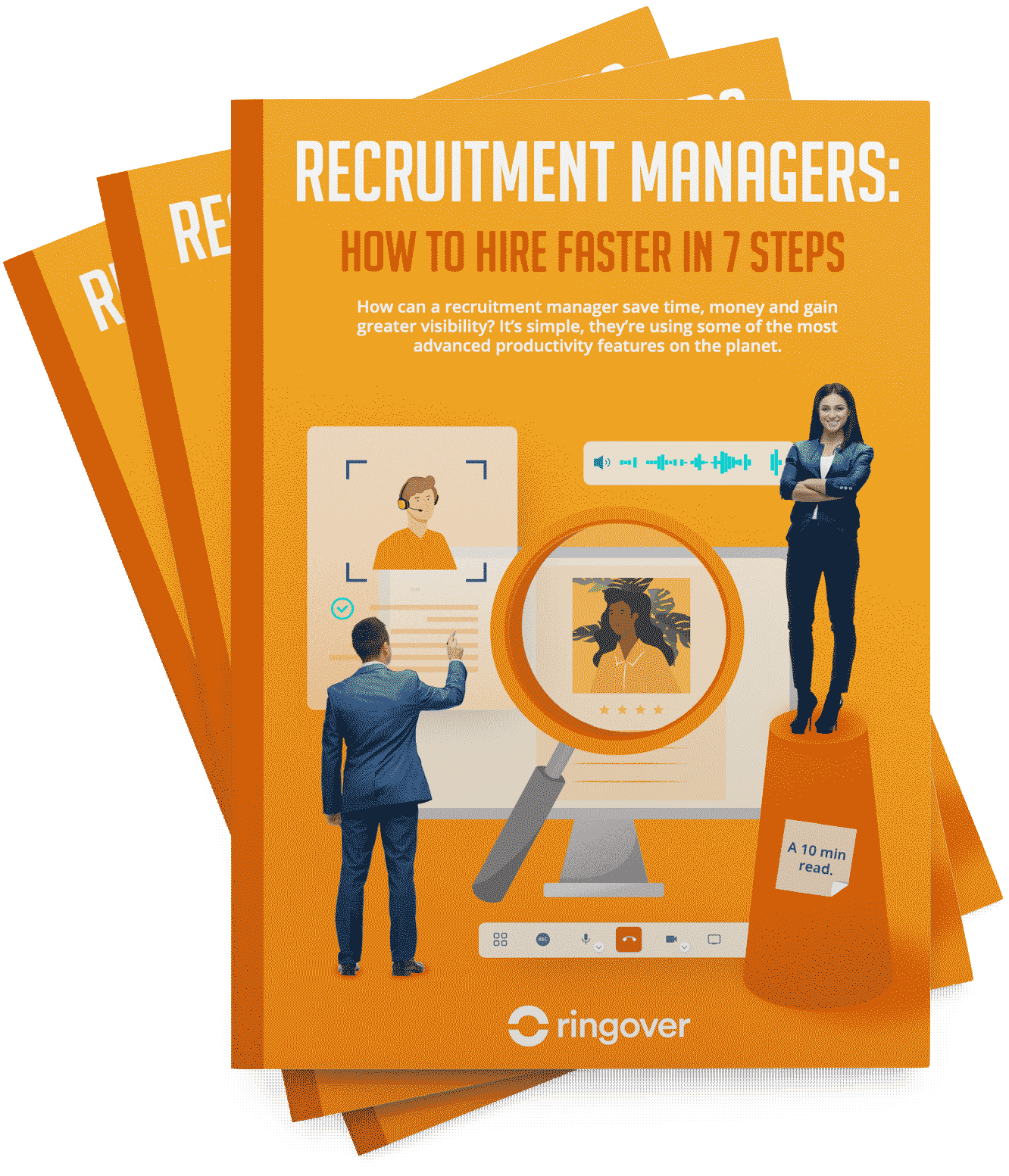Summary
Whether your focus is on a specific sector like hospitality or healthcare, or you plan to offer broad staffing services, mastering how to start a staffing agency from home is about efficiency in bridging the gap between job seekers and employers. This guide aims to equip you with the essential steps and vital information needed to launch your home-based staffing agency smoothly, ensuring a seamless journey from the planning stage to client acquisition.
Discover Ringover for Staffing5 Steps to Start a Staffing Agency from Home
1. Define Your Niche and Business Model
Specialising in a specific niche is essential for the success of your staffing agency. This could be anything from tech and healthcare to hospitality or creative industries.
By focusing on a particular area, you can establish yourself as an expert and better understand the needs of both your clients and job seekers. Conduct market research to identify high-demand professions in your area and consider your own experience and connections within these industries.
2. Set Up Your Legal and Financial Framework
Establishing a legal entity for your staffing agency is essential to protect your personal assets.
You can choose to form a Limited Liability Company (LLC) or a sole proprietorship, depending on your financial situation and the advice of a business attorney. Obtain necessary business licences and permits, and apply for an Employer Identification Number (EIN) from the IRS.
Additionally, open a business bank account and credit card to keep your personal and business finances separate.
3. Invest in Necessary Technology and Tools
To run a staffing agency efficiently from home, you need the right technology and tools. This includes applicant tracking software (ATS) to manage job candidates, payroll software to handle employee salaries, and time and attendance tracking systems if you plan to offer temporary staffing services.
One essential investment is a business phone system and omnichannel contact centre software, which allow you to reach candidates and clients at scale. Tools like Ringover are particularly beneficial for remote staffing agencies as they offer VoIP software that integrate seamlessly with CRMs like Salesforce and Hubspot and ATS like Bullhorn and Vincere, enabling efficient omnichannel communication with candidates and clients. VoIP phones provide features like call recording, automated call logging, and real-time analytics, all of which are valuable for tracking recruiter performance and ensuring transparency.
4. Secure Insurance and Compliance
Insurance is a critical aspect of starting a staffing agency. You will need to purchase general liability insurance, professional liability insurance, and workers' compensation insurance to protect your business from potential risks.
Familiarise yourself with labour laws and regulations, including overtime pay and workers' rights, to ensure compliance and avoid costly legal issues.
5. Develop a Marketing Strategy
A well-thought-out marketing strategy is vital for attracting clients and job seekers. Create a unique name and sales pitch that highlights your agency's purpose and value proposition.
Utilise social media, build a professional website, and engage in networking activities such as virtual events and webinars. Cold emailing and leveraging LinkedIn can also be effective social media recruiting activities to reach potential clients and showcase your expertise.
Key Requirements for Starting a Staffing Agency from Home
Licences and Permits
To operate a staffing agency legally, you need to obtain the necessary licences and permits. This includes applying for an Employer Identification Number (EIN) from the IRS, which is required for tax purposes. Additionally, you may need state-specific licences, such as an Employment Agency License, which is required in 24 states. Depending on your location, you might also need city or county licences and permits.
Insurance Coverage
Insurance is a critical requirement for any staffing agency. You will need to secure general liability insurance, professional liability insurance, and workers' compensation insurance. These policies protect your business from various risks, including legal issues and workplace injuries. Consulting with a business attorney can help ensure you have the right insurance coverage.
Financial Setup
Setting up a business bank account is essential to separate your personal and business finances. You will also need to determine your tax classification and payment structure, which includes understanding federal, state, and local tax obligations. This may involve income tax, self-employment tax, estimated tax, employers' tax, and excise tax.
Marketing and Online Presence
A well-designed marketing plan and a professional company website are essential for attracting clients and job seekers. Your marketing plan should outline your market position, goals, strategies, key performance indicators (KPIs), target market, and competitors. Utilising social media, search engine optimization, and other digital marketing strategies can also help you reach a wider audience.
Best Tips for Starting a Staffing Agency From Scratch
Specialising in a specific niche is one of the most effective strategies for launching a staffing agency. By focusing on a particular sector, such as healthcare, IT, or hospitality, you can become an authority in that area. This specialisation not only helps you stand out to clients seeking expert services but also streamlines your marketing efforts, making your outreach more targeted and effective.
Creating a comprehensive business plan is essential for your staffing agency's success. This document should encompass an executive summary, market and competitive analysis, a marketing strategy, financial forecasts, and an operational strategy. It acts as your business's roadmap, highlighting potential challenges and laying out growth strategies. Ensure your business plan is regularly updated to stay in line with your evolving business objectives.
Sound financial planning is foundational to starting a staffing agency. You'll need to account for startup expenses such as office space, insurance, legal fees, software, office supplies, employee salaries, and marketing costs. If necessary, consider securing a small business loan and make sure your financial infrastructure is robust. A clear understanding of your costs and revenue models is vital for sustaining profitability.
Maintaining robust relationships with clients and candidates is vital. Regular communication, understanding client needs, and offering personalised services are key to client retention and securing repeat business. Supporting candidates through the job placement process enhances their experience and encourages referrals.
Compliance with labour laws and regulations is imperative to avoid legal issues and safeguard your reputation. Stay informed about overtime regulations, workers' rights, and other employment laws to navigate the job market's complexities and mitigate risks to your business.
Build a strong tech stack by integrating your VoIP phone with your ATS and CRM so you can benefit from automatic data synchronisation and productivity features like click-to-call.
Is Owning a Staffing Agency Profitable?
Owning a staffing agency can be a highly profitable venture, given the right conditions and management.
Profit Margins
The profitability of a staffing agency is often measured by its net profit margin, which can vary widely depending on the industry, local market conditions, and the type of placements made. Generally, temporary staffing companies operate with net profit margins ranging from 3 to 10 percent. The largest temp staffing companies typically average around a 5 percent net profit margin.
Factors Influencing Profitability
Several factors influence the profitability of a staffing agency. Market demand and industry trends play a significant role, as agencies need to align their services with current market needs to remain competitive. The level of competition in the market also affects profitability, with agencies needing to differentiate themselves through specialised expertise, superior customer service, and innovative services.
Cost Structure
The cost structure of a staffing agency is another important aspect of its profitability. The main expenses include the cost of services (wages paid to the staffing personnel), salaries for agency staff, facilities expenses, and other operating costs such as marketing and administrative expenses. These costs typically account for around 60-70% of the revenue, leaving a gross profit margin of about 23%.
Pricing Strategies
Effective pricing strategies are vital for maintaining profitability. Staffing agencies need to set competitive yet sustainable rates that align with industry norms. The markup on placements can vary significantly, from 15% to 100%, depending on the type of job placement services being delivered. For example, placing highly skilled labour can allow for markups ranging from 50% to 75% or more.
Cash Flow Management
Managing cash flow is essential for the sustainability of a staffing agency. The time delay between expending working capital to cover employee wages and receiving payment from clients can create a cash flow gap. Strategies such as invoice factoring can help bridge this gap, providing immediate access to working capital and enabling agencies to meet financial obligations on time.
In Conclusion
Starting a staffing agency from home can be a rewarding and profitable venture, but it requires careful planning, the right tools, and a solid understanding of the industry. Remember to define your niche, develop a comprehensive business plan, and ensure you have the necessary licences and insurance.
Investing in the right technology and building a strong online presence are essential for efficiency and client attraction. To get an idea of how business solutions like Ringover can make a difference for your company, start your free trial today!
Starting a Staffing Agency from Home FAQ
How to Start a Remote Staffing Business?
- Pinpoint your niche to focus on a particular industry or job placement category. This specialisation makes you an authority, helping attract specific clients and candidates.
- Register your business, choosing an appropriate structure like a sole proprietorship, partnership, or Limited Liability Company (LLC).
- Secure all required licences and permits, and establish a business bank account to keep personal and business finances distinct.
- Start your recruiting agency operations.
How to Start a Staffing Agency with No Money Online?
Initiating a staffing agency without upfront capital is challenging but feasible. Employ the following strategies to kickstart your venture:
- Utilise free resources such as job boards, social media, and professional networks like LinkedIn for candidate sourcing and service promotion.
- Consider forming partnerships with seasoned recruiters or small businesses to pool resources and expertise.
- Emphasise low-cost marketing strategies like content marketing, webinars, and thought leadership to enhance your brand without heavy investment.
- Start on a small scale, focusing on a niche or a limited client base, and reinvest your profits for growth. If needed, look into financing options like small business loans or grants to manage initial costs.
-0c9fd.png)



